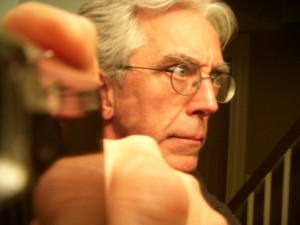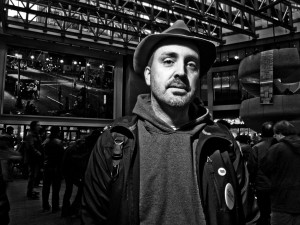Our Occupations (after the Occupations): Benson and Collis
BY Thom Donovan


Blogging this month at Harriet, I would like to ask mainly about how the occupations and social revolutions worldwide this past year have transformed artists’ and writers’ practices.
The following prompt was given to no fewer than 30 individuals, in hopes that it may contribute to “a […] collective portrait or chorus of responses to a changing political landscape”:
Something I am wondering about kind of broadly is how your practices might have changed since the beginning of the occupations, if we can mark this beginning in the fall of 2011 (the occupations obviously having their immediate precedent in the Middle East and Europe).
Do you think it may be possible to speak to this a bit? […] Succinctly, in a paragraph or two? Maybe it has had no perceivable effect, which is fine of course, and in which case you might talk about why it is important to maintain what you are doing parallel to (or beyond?) current social movements and political events.
The first two respondents are Steve Benson and Stephen Collis, respectively. Anticipate more to come this month!
Steve Benson:
I would want to make absolutely no claim to being intelligent or effective in adjusting my poetic practices in response to the occupations' developments, but I have felt and seen that I find my writing is unwilling to reflect as much bitter helplessness or even anger as before, in its ways of inflecting its reflections about whatever it is stating something with reference to.
I also noticed that when I gave a reading, without planning or making any conscious reference to the occupations' culture/ethics that I can remember (there was a lot of improvisation, and I haven't listened to a playback yet), I felt differently than in previous readings, as someone working out his occupation actually of the space (the Emily Harvey Foundation gallery on Broadway in Soho). My experience was of staging something simple enough to be just what it was (not as-if) and as I read and spoke finding the culture of it, its bracing and friction and orienting toward the space and the persons in it through the readings and speakings, gesturings and fiddlings with material stuff that I was doing over the 60 minutes I was presenting. I decided to start exactly at the time announced for the event, rather than 10-20 minutes later, assuming half the people would be trailing in while it was therefore already underway, not missing the beginning so much as joining the continuity—to find the space occupied, as if out of the ordinary—and likewise I decided to go on longer than a reading is conventionally thought to last (I was not the only performer on the billing). I think these factors, unintentionally but actually, reflected my learning from and thinking about the occupation.
Stephen Collis:
In one sense, I don't think my practice has changed at all because of Occupy—if anything, being involved in the movement has solidified the importance of what I had been doing for some time now, which is engaging with a social lyric voice evoking the experience of collective political affects: revolutionary rage, solidarity, hope for a better future, sadness at the loss and failures of past movements/revolutions that had now faded (this in books like Anarchive and The Commons—as well as the forthcoming To the Barricades). Thus it was an easy shift from writing poems about the Paris Commune (as I had been doing in the spring of 2011, around the time of the 140th anniversary of the Commune) to writing about Occupy. Indeed one poem, written in the summer of 2011—“Dear Common: Vancouver"—is in some ways my "archetypal" Occupy poem. So from this angle it's like events caught up with the poetry I was writing.
For some time I have been growing critical of too easy and too free a sense of the "avant-garde" (this especially in light of Conceptualism)—that too many poets thought being aesthetically "radical" was more than enough to engage with the "political." I've been coming around to a position best articulated by Gerald Raunig in Art and Revolution, where he refers to art and revolution as "neighbouring zones" whose "overlaps and concatenations...become possible for a limited time, but without synthesis and identification" (I'm going to write more about this at some point, probably in Jacket2, where I'm due to do some blogging later in the spring). So: we're often faced with a situation where poetry and politics seem to have nothing to do with each other, or where poetry and politics must be seamlessly indistinguishable ("my poetry IS politics!")—where in fact I think it more appropriate to think of them spatially, as neighbouring urban zones one frequently travels between, and which sometimes—in extraordinary moments—become "concatenated."
But in another sense, something has indeed changed. I began blogging for Occupy Vancouver the moment it began in October 2011, and blogged at times daily, certainly several times a week. I felt a real need to give voice to what I was seeing, to what I was picking up on in terms of what people were "feeling" and "saying" and "doing." Occasionally, this came out in the form of a poem (Mayakovsky: “The presence of a problem in society, the solution of which is conceivable only in poetic terms”), and I duly posted those to the Occupy Vancouver media blog too. Then I began to be asked to read poems at rallies and demonstrations. Now, there's no reason to assume you have to "dumb down" or change the way you write for such occasions, but I felt this sense of publicness to what I was writing generally since beginning to blog for the movement, the sense of writing not out of "my own" practice and position, but out of the movement, collectively, and I really didn't mind writing and reading "topical" poems for specific occasions/causes. I'm not sure these are poems that will find their way into books I publish, but I'm glad to have done them, and to have read them to large and affected audiences of "non-poetry" people. It's a crossing over into a neighbouring zone—one maybe we don't frequent as poets, but one in which musicians feel comfortable. Play the hit. Play the pop song. Play the one people can dance or sing along to.
It comes down to contexts I guess. And a revolution is a different context than an avant-garde, though they can overlap once in a while.
Thom Donovan lives in New York City where he edits Wild Horses of Fire weblog (whof.blogspot.com) and...
Read Full Biography

